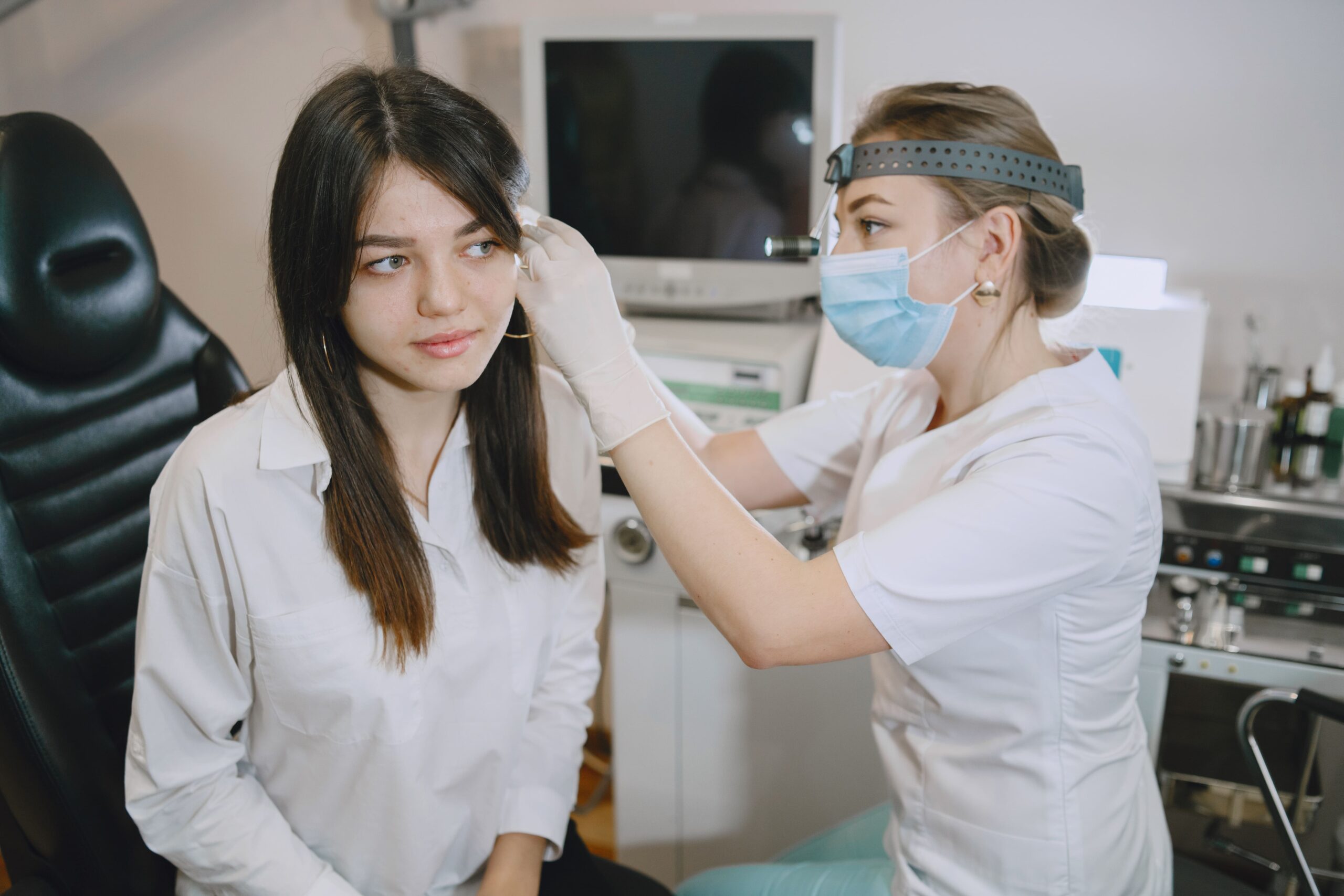Table of Contents
Hearing is a critical sense that allows us to communicate, connect, and engage with the world around us. Yet, many people delay seeking help when hearing problems arise, often dismissing early signs or believing they are too minor to warrant attention. This can lead to long-term consequences, both physically and emotionally.
In this blog, we’ll explore the most important reasons to visit an audiologist or hearing care consultant, how to recognize when to see an audiologist, the hearing test needs at different life stages, and the many benefits of hearing consultation, no matter your age.
Whether you’re experiencing mild hearing difficulties or simply want to be proactive about your hearing health, this guide provides valuable insights to help you take control of your auditory wellness.
Top 10 Reasons to Visit an Audiologist
Here are the most common and crucial reasons people consult with an audiologist or hearing care consultant:
1. You’re Having Trouble Hearing Conversations
If you’re constantly asking people to repeat themselves, whether in noisy environments or even in quiet ones, it’s time to get evaluated.
2. You Notice Ringing in Your Ears (Tinnitus)
Persistent ringing, buzzing, or hissing sounds may signal hearing damage or an underlying condition.
3. You Frequently Turn Up the Volume
If the TV or radio volume seems fine to you but too loud for others, your hearing may be declining.
4. You Feel Off-Balance or Dizzy
Hearing and balance are closely linked. An audiologist can assess whether inner ear issues are affecting your balance.
5. You Have a History of Noise Exposure
Years of working in loud environments or attending concerts may damage hearing over time, even if symptoms are delayed.
6. You Experience a Sudden Hearing Loss
Sudden hearing loss is a medical emergency. Visit an audiologist immediately if this happens.
7. You’re over 60 Years old
Age-related hearing loss is very common. Routine hearing screenings after age 60 are highly recommended.
8. You’re Experiencing Ear Pain or Fullness
Discomfort, fluid buildup, or a feeling of fullness may indicate middle ear problems.
9. You Have a Family History of Hearing Loss
Genetics can play a role. If your parents or siblings experienced hearing loss, you may be at risk too.
10. You Want to Monitor Your Hearing for Prevention
Even if you don’t have symptoms, annual checks help detect problems early and set a baseline.
What Is an Audiologist or Hearing Care Consultant?
An audiologist is a licensed healthcare professional who specializes in diagnosing, managing, and treating hearing loss and balance disorders. A hearing care consultant works alongside audiologists to provide expert advice, conduct assessments, and recommend hearing solutions like hearing aids or cochlear implants.
Both professionals play a vital role in helping individuals of all ages maintain optimal hearing and quality of life.
Why Hearing Health Should Never Be Ignored
Hearing isn’t just about your ears; it affects your brain, mood, relationships, and overall health. Yet many people wait 7 to 10 years after noticing signs of hearing loss before seeking help.
Delaying a visit to the audiologist can lead to:
- Cognitive decline
- Social withdrawal
- Depression and anxiety
- Miscommunication and relationship strain
- Decreased job performance
- Increased risk of falls due to balance issues
By scheduling a comprehensive hearing test at a trusted clinic like The Hearing Centre Singapore, you can stay on top of your hearing health.
When to See an Audiologist: Key Signs and Symptoms
Many people are unsure when to see an audiologist, especially if symptoms seem minor. Here are clear indicators that it’s time to schedule an appointment:
- Constantly asking “What?” or “Can you say that again?”
- Struggling to hear high-pitched sounds like birds or doorbells
- Feeling mentally drained after conversations
- Trouble hearing on the phone
- Avoiding social settings due to communication difficulties
- Unexplained balance problems or frequent falls
- Trouble hearing in meetings or classrooms
Don’t wait for symptoms to worsen. A hearing consultation is quick, non-invasive, and can provide immediate answers.
Understanding the Hearing Test Need at Any Age
A hearing test isn’t limited to seniors. People of all ages can benefit from regular hearing evaluations.
Infants and Children
- Newborn screening is critical for early speech and language development
- Speech delays or learning difficulties in children can be strong indicators that a hearing test is needed.
Teens and Young Adults
- Noise exposure from concerts, habits of listening to loud music, or gaming can lead to early hearing damage.
Adults (20s–50s)
- Baseline hearing tests help monitor hearing progression over time
- Occupational risks or chronic ear infections should be closely monitored.
Seniors (60+)
- Annual hearing tests are strongly recommended, especially for those who have been diagnosed with hearing loss
- Most hearing loss in this age group is gradual and manageable with early detection.
To understand the depth and nature of your hearing concerns, various diagnostic tools like pure tone audiometry tests, tympanometry, or ABR/ASSR are available at The Hearing Centre.
Benefits of Hearing Consultation: Why Early Action Matters
Still wondering whether it’s worth visiting an audiologist? Here are the key benefits of a hearing consultation:
- Early Detection of Problems: Identifies mild hearing loss or conditions before they worsen.
- Personalized Care Plan: Consultations allow for customized recommendations—whether it’s hearing aids, therapy, or medical referral.
- Better Communication: With improved hearing, you can engage more confidently in conversations and social settings.
- Cognitive and Mental Health Protection: Timely treatment helps protect brain health and reduce the risk of dementia.
- Improved Safety and Independence: Hearing better means you can detect alarms, traffic, or warnings in your environment.
- Tinnitus Relief: Many people with ringing in the ears find relief through specialized therapies or hearing aids.
- Support for Family and Caregivers: Audiologists can guide caregivers and families on communication strategies.
What Happens During a Hearing Consultation?
A hearing evaluation is simple, painless, and takes about 30–60 minutes. Here’s what to expect at The Hearing Centre:
Step 1: Medical and Hearing History
Your audiologist will ask about family history of hearing loss, symptoms of hearing issue, noise exposure, medications, history of any ear infection, and health conditions.
Step 2: Ear Examination
They’ll check for earwax buildup, infection, or structural abnormalities.
Step 3: Hearing Test
You’ll undergo several tests, such as:
- Pure Tone Audiometry
- Tympanometry (eardrum function)
- Otoacoustic Emissions (OAE)
Step 4: Review of Results
You’ll get a hearing profile (audiogram) showing your hearing levels across frequencies. The audiologist will discuss the nature of your hearing loss, such as the degree and type of the hearing loss.
Step 5: Care and Intervention
Depending on the results, the audiologist may recommend:
- Hearing aids
- Cochlear implants
- Further medical evaluations
- Tinnitus therapy
- Communication strategies
Treatment Options After a Hearing Test
After a comprehensive evaluation, your audiologist may suggest one or more treatment options.
1. Hearing Aids
Modern, digital devices amplify sound and can be tailored to individual needs.
Explore hearing aids from:
- Signia Hearing Aids
- Phonak Hearing Aids
- Starkey Hearing Aids
- Resound Hearing Aids
2. Implantable Solutions
Options like cochlear implants are for severe hearing loss.
3. Earwax Removal
Blockage may be the cause of temporary hearing issues.
4. Tinnitus Management
Sound therapy or hearing aids with tinnitus maskers can help.
5. Communication strategies
Learn strategies to cope with hearing loss in different settings.
How Often Should You See an Audiologist?
The frequency depends on your age and hearing health:
- Children: At birth, and if any developmental delays are noticed
- Adults under 50: Every 2-3years
- Over 50: Annually is recommended
- With diagnosed hearing loss: Annually or as recommended
Regular visits ensure your hearing aids or other treatments remain effective and up to date.
Conclusion
Your hearing connects you to the world, but many people overlook changes until it’s too late. Whether you’re noticing symptoms or just want to stay proactive, there are many reasons to visit an audiologist or hearing care consultant.
Understanding when to see an audiologist, recognizing your hearing test needs, and acting early brings immense benefits of hearing consultation, from improved mental health to restored social confidence.
Don’t wait. Take the first step toward better hearing today. Book your consultation with The Hearing Centre Singapore and get the care you deserve.
Frequently Asked Questions
Newborns are tested at birth, and adults should begin routine tests by age 60 or earlier if symptoms appear.
Usually, 30–60 minutes it depending on the severity of the hearing loss.
No. They are non-invasive and completely painless.
It varies. Some clinics offer free screenings, while full diagnostic tests are chargeable. Contact The Hearing Centre for current rates.
An audiologist focuses on hearing and balance testing and treatment. ENTs treat medical ear conditions, infections, or perform surgeries.
Common signs include blocked ears, muffled sounds, difficulty understanding speech, ringing in the ears, or frequent ear infections.
Yes. A professional can safely remove earwax, often restoring hearing immediately.
Not always. Over-the-counter remedies can be risky. It’s best to consult an audiologist for an earwax softening remedy and professional removal.
A hearing aid (HA) amplifies sound and is worn externally, while a cochlear implant is a surgically implanted device that not only amplifies sound but also bypasses the damaged parts of the ear to directly stimulate the hearing nerve. It bridges the gap between traditional hearing aids and more advanced hearing solutions.
Even if your hearing is normal, it’s recommended to get tested every 1–2 years after age 50. If you’ve been diagnosed with hearing loss, annual hearing evaluations are important to monitor changes and adjust treatment as needed. Children and individuals at higher risk may need more frequent testing.

Evlin is passionate about helping people with hearing loss. With years of experience in audiology, she has diagnosed and treated a wide range of hearing conditions across all age groups. She is accredited to conduct comprehensive hearing assessments and provide treatments for patients from newborns to the elderly. Committed to personalized care, she strives to empower patients to fully engage in life with better hearing.
Designation: Clinical Audiologist
Qualification: Bachelor of Health Science (Honours) (Audiology), University of Science Malaysia
Membership: .Society of Audiology Professionals in Singapore (SAPS)
